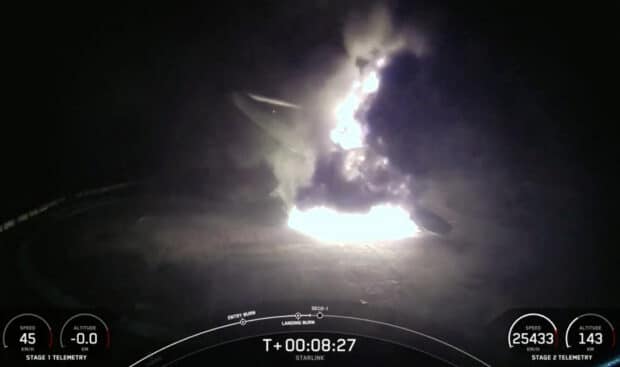
 This still image taken from a SpaceX video shows the first stage booster of SpaceX’s Falcon 9 tilting and blowing up upon landing onto the droneship off the Florida coast on August 28, 2024. – SpaceX’s stalwart Falcon 9 rocket has been grounded as the Federal Aviation Administration investigates why its first-stage booster tipped over and exploded while attempting to land after its latest launch, the agency announced August 28. The rare failure came after the rocket sent the latest batch of 21 Starlink internet satellites into orbit during an early morning launch. A webcast from Elon Musk’s company showed the first stage, which normally fires its thrusters to achieve a precise upright landing, tilting and blowing up as it descended onto the droneship off the Florida coast. (Photo by SPACEX / Agence France-Presse)
This still image taken from a SpaceX video shows the first stage booster of SpaceX’s Falcon 9 tilting and blowing up upon landing onto the droneship off the Florida coast on August 28, 2024. – SpaceX’s stalwart Falcon 9 rocket has been grounded as the Federal Aviation Administration investigates why its first-stage booster tipped over and exploded while attempting to land after its latest launch, the agency announced August 28. The rare failure came after the rocket sent the latest batch of 21 Starlink internet satellites into orbit during an early morning launch. A webcast from Elon Musk’s company showed the first stage, which normally fires its thrusters to achieve a precise upright landing, tilting and blowing up as it descended onto the droneship off the Florida coast. (Photo by SPACEX / Agence France-Presse)
WASHINGTONroaring21, United States — US regulators on Friday cleared SpaceX to restart launching its stalwart Falcon 9 rocket, as a probe continues into a rare mishap this week during a first-stage booster landing.
The Federal Aviation Administration (FAA) grounded the Falcon 9 rocket on Wednesday after a first-stage booster tipped over and exploded while attempting to land on a droneship off the Florida coast.
The early morning launch was otherwise successful, delivering the latest batch of 21 Starlink internet satellites into orbit.
Article continues after this advertisement“The SpaceX Falcon 9 vehicle may return to flight operations while the overall investigation of the anomaly during the Starlink Group 8-6 mission remains open, provided all other license requirements are met,” the FAA said in a statement Friday.
FEATURED STORIES TECHNOLOGY vivo launches V40 Lite with 5000mAh battery covered by 50-month warranty, starts at Php 13,999 TECHNOLOGY Galaxy Buds3 Pro: Delivering tailored sound wherever you go TECHNOLOGY Very mindful, very intuitive: ASUS’ most superior AI PC yet, the Zenbook S 14, empowers you to achieve moreREAD: SpaceX grounded after rocket falls over in flames at landing
A webcast from Elon Musk’s company showed the first stage, which normally fires its thrusters to achieve a precise upright landing, tilting and blowing up as it descended onto a droneship off the Florida coast.
Article continues after this advertisementAlthough landing the booster is a secondary objective, and no lives or public property were at risk, the reusability of the entire rocket system is crucial to SpaceX’s business model.
Article continues after this advertisementIt broke a more than three-year streak of hundreds of successful booster landings.
Article continues after this advertisementFalcon 9 is the workhorse of SpaceX’s fleet, trusted by the US government and private industry to propel satellites and astronauts into orbit.
It was last grounded for around two weeks in July when its second stage engine experienced an anomaly that prevented it from deploying another batch of Starlink satellites at the correct altitude, leading them to burn up on re-entry through Earth’s atmosphere.
Subscribe to our daily newsletter
